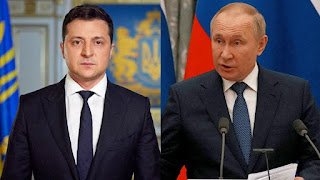Beyond Russia-Ukraine talks, here's what Putin really wants from the West
On day-five of the invasion, Ukraine continued to fend off Russian forces while suffering large-scale damages. Western powers announced fresh sanctions to hurt Russia and are sending jets and missiles to Ukraine. As Russia's isolation deepened, its currency Ruble faced more trouble, and domestic protests spiralled, President Vladimir Putin put his nuclear force on high alert, triggering more condemnation from the US and its allies.
Amid al
VETO ON FUTURE NATO MEMBERSHIP FOR UKRAINE
Russia also wanted a Russian veto on future Nato membership for Ukraine. Unlike some other Soviet constituents, Ukraine has been waiting to be a Nato member for about two decades.
Part of Russia's insistence on a veto is because Article 5 of the Nato charter commits member countries to protect each other in case of an invasion but this does not apply to a non-member country such as Ukraine. The West had ruled out Russia's wish to have a Russian veto on future Nato membership for Ukraine.l this, a Ukrainian delegation is meeting Russian officials for talks near the Belarus border today (February 28). All planes, helicopters and missiles stationed on the Belarusian territory will remain on the ground during the Ukrainian delegation's travel, meeting and return.
"A platform for negotiations between Russia and Ukraine in Belarus has been prepared," the Belarusian foreign minister has said.
When Putin launched a pre-dawn and wide-scale invasion of Ukraine on February 24, he said he wanted to "demilitarise" his former Soviet constituent and protect two rebel-controlled breakaway regions from "Ukrainian atrocities".
He also said Russia was responding to its own security threats. But what Putin really wants can be understood more clearly from his highly contentious wish-list that he laid out in detail for the first time and handed to the West in December 2021.
The line pursued by the US and Nato over recent years to aggressively escalate the security situation is absolutely unacceptable and extremely dangerous, Moscow had said. The Russian proposals featured in two documents: a draft agreement with Nato countries and a draft treaty with the US.
Here is what Putin broadly wanted from the West.
NATO MUST EXIT EASTERN EUROPE
Russia wanted a legal guarantee that the US-dominated North Atlantic Treaty Organization (Nato) would give up military activity in eastern Europe and Ukraine. One of the demands requires Russia and Nato not to deploy additional troops and weapons outside the countries where they were in May 1997.
This is primarily because the military alliance started its eastward expansion in former communist states in East Europe after May 1997. This would include much of eastern Europe, including Poland, the former Soviet countries of Estonia, Lithuania, Latvia, and the Balkan countries.
Nato's expansion has actually meant a security concern for Russia and jeopardises Putin's larger dream to annex the Soviet constituents (that became independent after the Empire's collapse in 1991) in the name of culture, history, language and nostalgia.
But Nato is unlikely to abandon military activities there, especially after Russia's invasion of Ukraine. Currently, multi-nation Nato battalions are deployed in Poland and the Baltic states of Estonia, Latvia and Lithuania that were once in the Soviet Union.
The US had said it would not compromise the fundamental principles on which European security is built, including that all countries have the right to decide their own future and foreign policy, free from outside interference.
Nato had also said Russia cannot have a veto on further expansion of the alliance and Nato has the right to decide its own military posture. Russia is not a member of Nato and doesn't decide on matters related to Nato, Poland had said.
Ukraine had itself said it has an exclusive sovereign right to run its foreign policy, and only it and Nato can determine the relationship between them.
DEPLOYMENT OF NUCLEAR WEAPONS
Russia also wants the removal of US nuclear weapons from Europe. The treaty with the US, if agreed upon, would prevent Moscow and Washington from deploying nuclear weapons outside their national territories. That would end Nato's nuclear-sharing arrangements, where European Nato members provide aircraft capable of delivering US atomic weapons.
However, much has changed since Russia invaded Ukraine. For example, Belarusians voted Monday to allow the country to host nuclear weapons and Russian forces permanently.
Security and diplomatic analysts suggest some of the demands Russia knows would not be met and that will provide a diplomatic distraction to undertake and continue military operations. The West understands Putin's nuclear messaging also seems crafted to deter the US and its allies from further intervention in Ukraine and economic measures.
The contours of the Russia-Ukraine talks are not yet precise. And their outcome remains to be seen. But the challenge for the Nato allies now is to keep backing Ukraine and, at the same time, deter Putin from carrying out some of his threats.










.jpeg)

No comments: